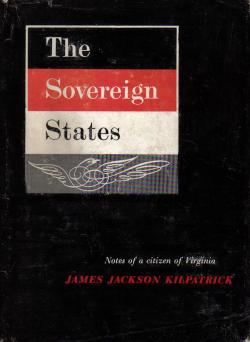|
 |
|
|||||||||||||||||||||||||||||||
|
From the original publisher: “When he wrote The Sovereign States, Kilpatrick was editor of the Richmond News-Leader. This book, which was published in 1957, may properly be considered, I think, the southern reply to Brown vs. Board of Education, the Supreme Court decision of May 17, 1954, which undertook to put an end to racial separation in the public schools. Although the school decision was the immediate stimulus to the writing of the book, its concern is with the much larger issue of the usurpation by Washington of the authority of the states. “Kilpatrick is a fine stylist, and he developed his thesis with the eloquence of the great Virginia orators he so much admires. Our government, Kilpatrick argues, was constitutionally intended to be a federation of sovereign states jointly controlling their mutual agent, the federal government. It is true that the sovereign states jointly delegated some of their powers, but they did not become less sovereign thereafter. They remained separate, respective states. Although the Fourteenth Amendment has greatly weakened the power of the individual states, as has the income-tax amendment, the states still have the means to protect themselves if they would use it. This was the “right of interposition,” as developed by James Madison in his report of 1799 to the Virginia House of Delegates during the great controversy that resulted from the Alien and Sedition Acts. . . . “Kilpatrick gives many examples of the use of interposition by individual states, which are of the greatest interest in themselves, and clearly show how much we have lost of the independence Americans once regarded as their treasured and characteristic possession.” – Henry Regnery, from Memoires of a Dissident Publisher, (1985) |




